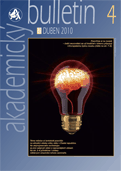Academy of Sciences of the Czech republic › Vědní oblasti › Humanities and Social Sciences
III. Humanities and Social Sciences
Nobel Laureate Eric Maskin in Prague
17 Jun 2013

Cubisti Cubismo
6 Jun 2013

The Director of the Institute of Art History, Academy of Sciences of the Czech Republic, Prof. Vojtěch Lahoda, was involved in the preparation of the international exhibition Cubisti Cubismo, which is open from 8 March to 23 June 2013 at the Complesso Monumentale del Vittoriano in Rome. The curator, Charlotte N. Eyerman, an art historian from Los Angeles, planned it as a wide-ranging survey of Cubists and Cubism, from Picasso, through Russian artists, to figures from the USA (Max Weber) and Great Britain (Wyndham Lewis). She presented Cubism as a trend that eventually influenced all local schools, and emphasised the spread of Cubism into decorative art, architecture (Czech examples were at least shown in photographs and a model of Chochol’s house in Neklanova Street), and into film.
Art Historian Keith Holz in Prague
4 Jun 2013

Keith Holz, Associate Professor of the Western Illinois University in Macomb, examines in his lecture held on 12 June 2013 at 3.30 p.m. in the Institute of Art History, Husova 4, Prague 1, room 117, newly available letters by and about Oskar Kokoschka from Moscow and Zürich archives. This lecture revises extant interpretations of his art and activities in Czechoslovakia (1934–1938). Kokoschka's public role as an outspoken advocate for human rights, his pursuit of democracy through educational reform (the Volkshochschule movement), and his role as a critic of fascist governments are related to his less understood, but elaborate, network of supporters, friends and family within and beyond the borders of the Republic.
Václav Havel in Contemporary History
20 Mar 2012

Conference Career horizons: Academic trajectories and early stage researchers
1 Dec 2010

December 7, 2010 - In the Czech context the debate on the early stage phase of academic careers is limited to high numbers of uncompleted doctorates and low financial appraisal. The aim of the workshop is to open the debate more broadly. We are interested in exploring and discussing the relationship between academic positions of early stage researchers, their career prospects and changing institutional contexts of knowledge production.
Consequences of being rich: wealth and population are key drivers of invasive species in Europe
10 Jun 2010

A new study of biological invasions in Europe found they were linked not so much to changes in climate or land cover, but to two dominant factors – more money and more people. Wealth and population density, along with an increase in international trade and commerce, were the forces most strongly associated with invasive species that can disrupt ecosystems and cause severe ecological or agricultural damage, scientists said.





